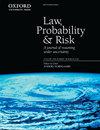Are judges influenced by legally irrelevant circumstances?
IF 1.4
4区 社会学
Q1 LAW
引用次数: 1
Abstract
Judges should not be influenced by legally irrelevant circumstances in their legal decision making and judges generally believe that they manage legally irrelevant circumstances well. The purpose of this experimental study was to investigate whether this self-image is correct. Swedish judges (N = 256) read a vignette depicting a case of libel, where a female student had claimed on her blog that she had been sexually harassed by a named male professor. The professor had sued the student for libel and the student retracted her claim during the hearing. Half of the judges received irrelevant information - that the professor himself had been convicted of libel a year earlier, while the other half did not receive this information. For the outcome variable, the judges were asked to state how much compensation the student should pay the professor. Those judges who received information about the professor himself having been convicted of libel stated that he should be given significantly less compensation than those who did not receive the irrelevant information. The results show that the judges’ decision was affected by legally irrelevant circumstances. Implications for research and practice are discussed法官是否会受到与法律无关的情况的影响?
法官在做出法律决策时不应受到与法律无关的情况的影响,法官通常认为他们能很好地处理与法律无关情况。这项实验研究的目的是调查这种自我形象是否正确。瑞典法官(N=256)阅读了一个描述诽谤案的小插曲,一名女学生在她的博客上声称她受到了一位匿名男教授的性骚扰。教授以诽谤罪起诉该学生,该学生在听证会上收回了自己的主张。一半的法官收到了不相关的信息——教授本人在一年前被判诽谤罪,而另一半则没有收到这些信息。对于结果变量,法官被要求说明学生应该向教授支付多少赔偿。那些收到教授本人被判诽谤罪信息的法官表示,与那些没有收到无关信息的法官相比,他应该得到的赔偿要少得多。结果表明,法官的裁决受到与法律无关的情况的影响。讨论了对研究和实践的启示
本文章由计算机程序翻译,如有差异,请以英文原文为准。
求助全文
约1分钟内获得全文
求助全文
来源期刊

Law Probability & Risk
MATHEMATICSSTATISTICS & PROBABILITY&-STATISTICS & PROBABILITY
CiteScore
2.10
自引率
28.60%
发文量
8
期刊介绍:
Law, Probability & Risk is a fully refereed journal which publishes papers dealing with topics on the interface of law and probabilistic reasoning. These are interpreted broadly to include aspects relevant to the interpretation of scientific evidence, the assessment of uncertainty and the assessment of risk. The readership includes academic lawyers, mathematicians, statisticians and social scientists with interests in quantitative reasoning.
The primary objective of the journal is to cover issues in law, which have a scientific element, with an emphasis on statistical and probabilistic issues and the assessment of risk.
Examples of topics which may be covered include communications law, computers and the law, environmental law, law and medicine, regulatory law for science and technology, identification problems (such as DNA but including other materials), sampling issues (drugs, computer pornography, fraud), offender profiling, credit scoring, risk assessment, the role of statistics and probability in drafting legislation, the assessment of competing theories of evidence (possibly with a view to forming an optimal combination of them). In addition, a whole new area is emerging in the application of computers to medicine and other safety-critical areas. New legislation is required to define the responsibility of computer experts who develop software for tackling these safety-critical problems.
 求助内容:
求助内容: 应助结果提醒方式:
应助结果提醒方式:


